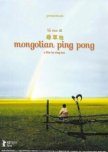Mongolian Ping Pong is a charming slice of life film about two families living in the vast, verdant, Mongolian steppe. The great adventure for three little boys begins when one of them finds a ping pong ball floating in a stream. Not knowing what it is, he goes in search of answers. Ultimately, he finds out vaguely that it is a ping pong ball, and that ping pong is the national game, and the small white orb is the national ball. The seven-year-old makes the leap in logic that he has THE national ball and must return it to Beijing. The problem being, neither he nor his friends know where Beijing is.
Much of this film is wrapped up in showing slow, flowing shots of the terrain, an endless sea of green, distantly bordered by mountains. The boys live in a world without electricity and running water. There are no phones, video games, or computers. One father buys a television, but even using his long herding rod as an antenna with cans and cooking strainers attached, can't get a signal. Climbing, exploring, riding their horses, playing with sling shots, and contemplating the mystery and responsibility of their new found treasure fills their days.
The strength of this film is in its hospitality and letting us be guests, sharing for a few brief moments, in a world foreign to most of us. There are no great conflicts outside of the ping pong ball, although it is obvious that a creeping consumerism is beginning to invade the old way of doing things. For the most part, it is best to simply immerse yourself in the warmth and curiosity of these children and enjoy the expansive beauty of a solid green sea.
Much of this film is wrapped up in showing slow, flowing shots of the terrain, an endless sea of green, distantly bordered by mountains. The boys live in a world without electricity and running water. There are no phones, video games, or computers. One father buys a television, but even using his long herding rod as an antenna with cans and cooking strainers attached, can't get a signal. Climbing, exploring, riding their horses, playing with sling shots, and contemplating the mystery and responsibility of their new found treasure fills their days.
The strength of this film is in its hospitality and letting us be guests, sharing for a few brief moments, in a world foreign to most of us. There are no great conflicts outside of the ping pong ball, although it is obvious that a creeping consumerism is beginning to invade the old way of doing things. For the most part, it is best to simply immerse yourself in the warmth and curiosity of these children and enjoy the expansive beauty of a solid green sea.
Cet avis était-il utile?

 55
55 219
219 11
11























